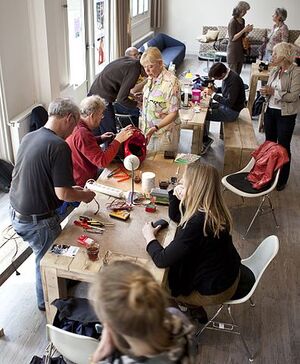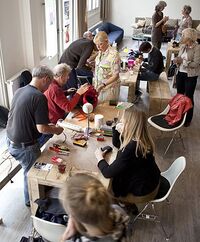
The first Resourcing CANs section is about ways of seeing resources, Resourcing CANs 2 looks at different forms of resource
Apps and tech[edit | edit source]

how technology can help all aspects of the development of Citizen Action Networks,
and including particularly any tech which enables gathering and gatherings (as the essence of networks). So to help getting started, although not the only the thing or necessarily even the most important thing, some sort of online presence in the fairly early stages, eg to help people find you. eg draft and design ideas on a wiki page, google docs, etc., then easy to use, low cost options for simple website, social media presence, etc, ideally with at least some interactive content / options promoting participation and involvement.
"For sure, the days of neighbourhood online networks are not far off. Local nets will give you all this and better, more efficiently, less expensively, with genuine options for user-involvement and interaction - and by extension in my view, conversational democracy. But without the paper." Kevin Harris[1]
Online community tools are good enough, and sufficiently widely adopted, to enable action[edit | edit source]
Coronavirus, and its strange distancing, compels us all to rethink how we come together. Our mutual care and sense of collective responsibility is expressed by NOT being physically close, or even proximate to each other.
So counter-intuitive is this - and perhaps especially so, after our recent periods of street activism, whether over environmental or constitutional matters - that it's no surprise we've rushed to our online spaces, especially in their more sociable forms.
And where they're not sociable enough, we've made them more so. People use Instagram for Q&As, or Zoom to conduct large, pulsing conferences, or Facebook to instantly organise their community's mutual aid.
References: A time for quick action, Tessy Britton blog about how Participatory City Every One Every Day is moving online links needed[2]
We need digital learning clubs in CANs, and evolution of civic tech to support CANs[edit | edit source]
I suggest we need the equivalent of "homebrew" digital clubs today. These would be locally specific, friendly spaces (we assume the spaces would be virtual as much as actual). Here, residents and citizens could explore, benchtest, and co-develop tech that serves their concrete and communal needs. (We've called for Learning Clubs before on this site).
It's the kind of club we (at A/UK) easily imagine being an element in a CAN (a citizen action/community agency network). But you can see it happening in practice with Ed Saperia's Newspeak House, which regularly matches needful communities with tech practitioners.
Presuming that central government doesn't have the willingness or foresight to support such civic tech, is this where philanthropic or foundation money could usefully go? The recent embrace of readily available social tech by hundreds of thousands of mutual aiders shows, at the very least, there is demand that would respond to possibilities and partnerships.
Could one part of the question, "what is the next level of organisation for this flourishing mutualism?" be about how we develop the next stage of civic tech? That is, not just for survival needs, but as a springboard - towards ambitions and visions for more self-organising and self-provisioning? August 2020[3][4]
CANs using tech[edit | edit source]
- localized community action groups, (in Cape Town, South Africa), usually starting with a few people on a WhatsApp or Telegram group.[5]
'More: The Alternative UK, Technology category
External links[edit | edit source]
- Initiative for Digital Public Infrastructure, added 14:48, 25 September 2022 (UTC)
- New Public, For Better Digital Public Spaces, added 14:48, 25 September 2022 (UTC)
- Civic Tech Field Guide, the world's largest collection of projects using tech for the common good. added 14:48, 25 September 2022 (UTC)
Citizen data initiatives[edit | edit source]
"Finding and extinguishing the sparks of
stigma, xenophobia, hunger and poverty cannot be achieved through the collection of epidemiological data at all. Rather this requires social data, collected and reported by professors of the street, based on real-world
experience." Presentation on Cape Town CANs, Cape Town Together[6]
"But I have realized that over time with our food delivery program the CAN team
has definitely learned a huge amount of information, a lot of it not yet written down, about where the most vulnerable families are, where the church networks or neighbourhood groups are already stepping in and where the gaps are. Our main thing has been that most of this information is just in our heads. But if we sat down as a group we could probably generate a huge amount of social data of this kind for our specific area- definitely something to do in the CAN when we have a bit of time!"
- Manya Kenilworth CAN, Presentation on Cape Town CANs, Cape Town Together[7]
"There are many ways to be poor, but in today's world not having the right kind of information represents a certain kind of poverty. As long as outsiders decide what is important and are in a position to ask all of the questions, we will never be able to solve our own problems. Without information we are nothing at all and have no power to understand things or to change our life. If Inuit society is to develop we must be able to collect and use information according to our own terms." A Nunavik Inuk
see also: Citizens data initiative
section needed
Commons and free stuff[edit | edit source]
"I have no illusions that we can simply declare a Law for the Commons. The very idea and its variations must first be formulated for our modern context, and then fought for. But at a time when existing regimes of law and governance are in a shambles – losing public respect, failing to meet people's basic needs, destroying the Earth – I believe that commoning and laws to enable it have a bright future. Commons can meet people's needs in fair, open and effective ways, and provide a dignity, respect and equality that the market/state order has trouble achieving. By cultivating more direct engagement with people, and demanding that they step up to responsibilities, commons also have great promise in improving ecological stewardship." David Bollier[8]
"Commoning is a radical concept because it insists upon the active, knowing participation of people in shaping their own lives and meeting their own needs." David Bollier and Silke Helfrich[9]
section needed
Community currencies[edit | edit source]
"Complementary currencies can reveal to us that, even in the poorest places, there are vast living assets - ideas, skills, time, love even - that can turn our ideas of scarcity on their heads." David Boyle
section needed
Community funding intiatives[edit | edit source]
eg via
- community energy etc.
- recycling and circular economy schemes
Community media[edit | edit source]
incl community radio, video, community art and media services
Education and learning resources[edit | edit source]
skill sharing, etc.
Funding citizen and community action[edit | edit source]
including: avoiding overdependence on funding, towards sustainable funding, ethical funding, etc
section needed
"this (funding system) is not enough for the social, economic and environmental crisis we face, even more so in the post covid context.
So many studies have shown the incredible value created if social capital is higher in a neighbourhood. Social capital boosts health and reduces anxiety, it reduces unemployment, it increases academic achievement, it increases household income, it reduces crime rates, it stimulates climate change action, it increases political participation, it increases attachment to place and economic growth, it stimulates entrepreneurship, it builds resilience and creates positive life outcomes. In one study it showed that social capital was more important to education outcomes than education spending. The list of studies goes on and on." Designing participation systems around people, not institutions, Tessy Britton, Feb 24, 2021.[10]
Public interest law resources[edit | edit source]

eg settig up a CIC?, etc
section needed
Maps for citizen and community action[edit | edit source]
How maps, geographic, network, relationship, and asset mapping can help.
see also: Maps for community action
Spaces, premises and land[edit | edit source]

including hopefully something on underserved rural areas eg cafes, pubs, community pubs, community shops, friendly local churches, arranging community transport, etc.
"We're like a road show. We don't have a space, so we use the community." Lucy Gomez-Feliciano[11]
see also: Urban sustainability
Other forms of resources[edit | edit source]
Arts, culture, theatre, film, video, games, etc.
Are there any games, eg card decks, to help groups envision and help develop ideas for Integrated community resources, or their ideal set of community resources, or could we help in the development of such? Any resources like this for Slipham? (link needed)
Other aspects of community resources[edit | edit source]
Community owned or managed assets. Questions of advocacy, developing ownership, management etc.
"A great high wall there, it tried to stop me. A great big sign there, said 'private property'. But on the other side, it didn't say nothing. That side was made for you and me." Woody Guthrie, This Land Is Your Land
Ways of working[edit | edit source]
section needed
"...we need to challenge ourselves to build toolkits that focus on the informal, the local and the conversational. @zenrainman[12]
Notes and References
- What is a CAN? Information from The Alternative UK, thealternative.org.uk
- Daily Alternative articles about building CANs, thealternative.org.uk/dailyalternative
- CAN Insights, David Wilcox, Decmember 2020, Appropedia file
- ↑ Kevin Harris, May 5 2009
- ↑ Want to keep a city participating in Dagenham, or citizens assembling in Paris? Online community tools are now powerful enough to support vital activity, April 5, 2020 thealternative.org.uk
- ↑ Alternative Editorial: Look to communities - they're the real testbeds of tech innovation, August 23, 2020, thealternative.org.uk
- ↑ see also: We need civic operating systems to manage the social fabric for healthy communities – plus a social app store of tools, David Wilcox, August 17, 2018 networkedcity.blog
- ↑ We're delighted to discover Cape Town's CANs movement - "community action networks" that have been keeping a city together, under Covid, Daily Alternative Feb 18, 2021
- ↑ static1.squarespace.com
- ↑ static1.squarespace.com
- ↑ resilience.org September 15, 2015
- ↑ Patterns of Commoning
- ↑ tessybritton.medium.com
- ↑ Early Learning and Health Director of Logan Square Neighborhood Association. transitionnetwork.org / Chicago
- ↑ medium.com